Every hunter will probably come across someone who questions, or possibly attacks, the activity of hunting. Here’s how to answer.
by Leon Pantenburg
Start by being nice and respectful: The person with the questions may be honestly seeking info and might be considering joining our ranks.
All the uninformed person might know is that you (a hunter) intend to hunt and kill an animal and eat it. And that sounds like something a Neanderthal would do.
So what’s the allure? Why bother? Isn’t hunting inhumane? What’s wrong with people who kill things to have a good time? How can you be so heartless? And it goes on…
Here’s some common questions and my responses. Think what yours might be…
Why do hunters say “harvest,” instead of “kill”?
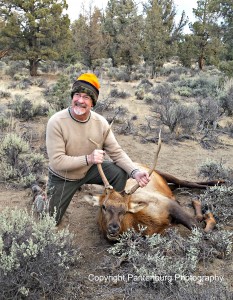
I killed this bull elk on a cold November day in the Oregon high desert.
One definition of “harvest” according to Webster, is “to catch, take, or remove for use.”
Game animals are a crop, and they are managed so they are in balance with the habitat. (As a side benefit, when you enhance habitat for game animals, other non-game species also benefit.) Every fish and game department in the country uses hunting as a game management tool. Best hunting rain gear?
Tags issued are based on scientific data, and are allotted in specific areas to regulate how many are killed.
Hunters are bloodthirsty wackos with a need to kill something.
These psychos don’t last long as hunters. It takes way too much time, effort and energy to legitimately pursue game animals. There is not enough killing to satisfy someone’s bloodlust.
In Colorado, for example, the 2016 success rate for elk harvest was about 30 percent for non-residents and 45 percent for residents. In Oregon, where I hunt, the success rate on elk is about 15 percent.
Apply this to football – who would go to a game where there is at best a 30 percent chance of someone scoring a touchdown?
Then why do you have to kill something? Can’t you go out in woods and just hike around?
I can, and I do. I’m outdoors year round, and love the seasonal changes. But there is something about pursuing wild game that is embedded in human DNA, and there is nothing like hunting to make me feel alive.
Frequently, hunting ends up being a walk in the woods carrying a bow or a firearm. I’m fine with that.
Hunting is a cruel blood sport: Mother Nature is cruel. In the wild, animals don’t usually get a humane death. They may die from starvation, a broken leg or be ripped apart by wolves, coyotes, cougars or other predators. Their eventual death may be a painful, lingering one. The swift bullet or arrow is the quickest, least painful way to go.
Trophy hunting is bad: It depends on the situation.
To an African villager whose crops are decimated by overpopulated elephant herds, a hunter who culls the herd is a godsend. That hunter will have to buy an expensive hunting permit and hire local people to guide, track, skin and process the downed animal. (Tourism promoters point out that every tourist dollar turns over in a community seven times!) If an animal is killed the meat is traditionally given to the nearest village.
Outlaw trophy hunting, and this economic boon goes away. If no trophy hunters are allowed, villagers will do what they have to to protect their crops and villages.
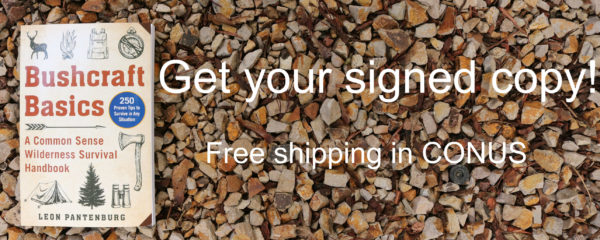
There are no legal seasons for endangered species. Today, every wild animal is managed and regulated by fish and game departments to make sure they don’t become endangered.
Hunters pay for conservation: Fact is, over 90 percent of habitat management funds are generated from fees from hunting and fishing licenses.
All hunting-related expenditures in Nebraska totaled $527 million in 2011, according to the National Survey of Fishing, Hunting, and Wildlife-Associated Recreation 2011 National Survey (revised in 2013, the latest information available).
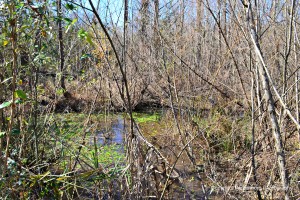
Anytime wildlife habitat is enhanced or preserved, all the animals in the area benefit.
Success is not guaranteed: Unless you’re hunting in a fenced enclosure, nobody can promise you’ll even see a game animal. I’ve hunted several seasons in Idaho where I never saw an elk.
Hunting is a family tradition. My Dad taught me hunting ethics. With the exception of sparrows and starlings, feral pigeons in the barn that ruined cattle feed, and rats in the corn crib, I never killed anything we couldn’t eat.
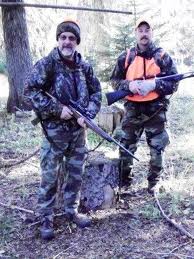
Me and Mike all cammied up to go elk hunting. (Bob Patterson photo)
My brother, Mike Pantenburg, has been my hunting partner since he was 12 and passed his hunter safety class. Some 40+ years later, we still try to hunt together every fall.
Hunting season, since time immemorial, has been a time for the tribe to gather. These events strengthen family bonds.
Hunting puts you in touch with nature: My friend, Lily Raff Macallu, wrote “Call of the Mild,” a memoir about a big city woman learning to hunt. Lily took up fishing after moving to Oregon, and said it opened up a whole new world of awareness.
Instead of seeing a river as a water flow, she started seeing the structure in it, the different currents, and all the things that contribute to fish habitat. She took up hunting to gain the same awareness on land.
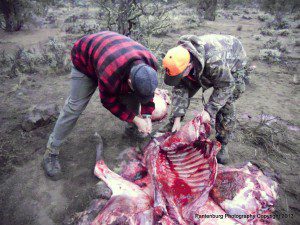
This elk meat is organic, non GMO and delicious. The animal lived in the wild until it was harvested.
I like to know where my food comes from: I’m a meat hunter, and could care less about trophies. I will kill the first legal animal that comes along.
My wife and daughter love elk meat. When I go elk hunting, my instructions are to harvest a cow or a spike (if legal), because the meat tastes better. The elk I killed last year was born and grew up about 15 miles from where I live. It lived its whole life in the Oregon high desert, and was wild and free until it was killed.
And those are my reasons for hunting. I still have trouble sleeping the night before opening day, and still get that feeling of awe and respect as I stand over a downed big game animal.
And I don’t ever want to get over that.
Please click here to check out and subscribe to the SurvivalCommonSense.com YouTube channel – thanks!
an>

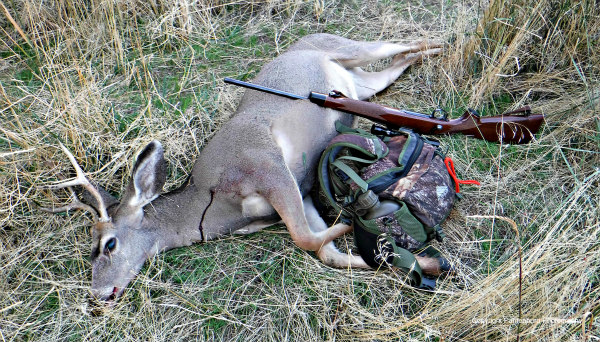
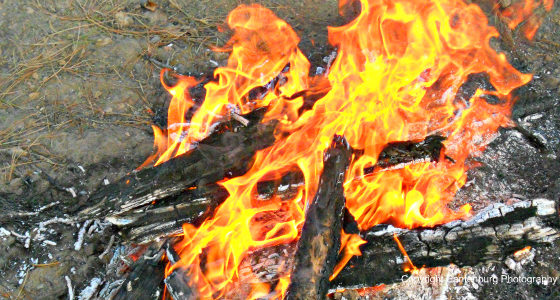
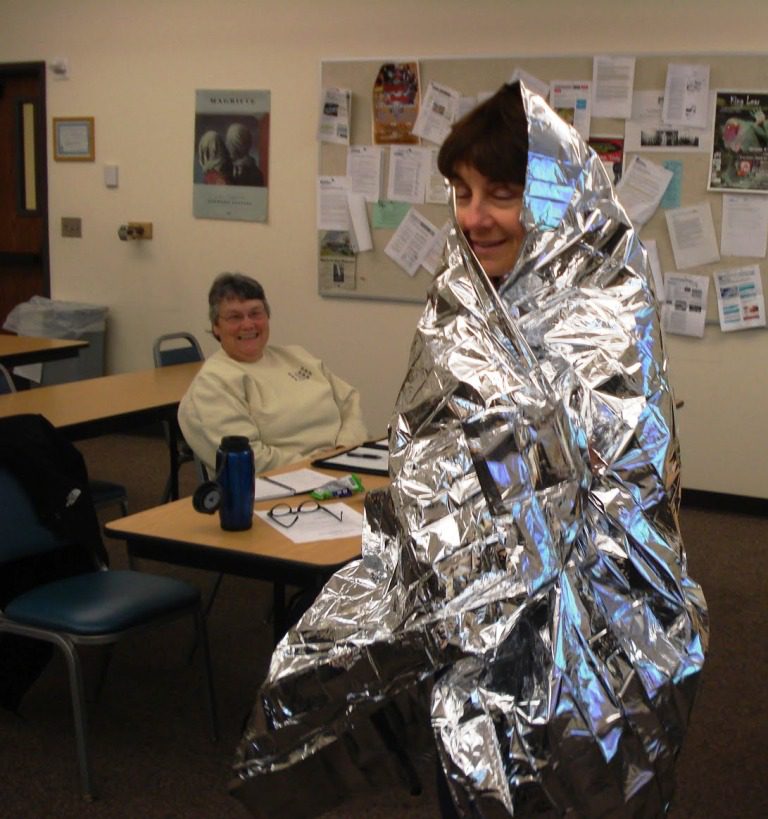
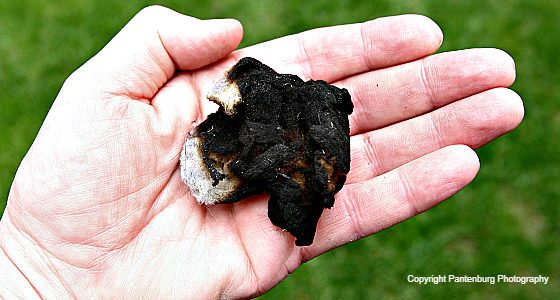
Anna
I’m a vegetarian, and not an outdoor person. I don’t like leather. I have no personal interest in hunting. People are sometimes surprised to hear that I DO support hunting by those who enjoy it. There are three main reasons for this: 1) for those who do eat meat, hunting is more humane than factory farming; 2) an imbalance of the population of large game – such as deer – greatly increases the chance of an accidental collision of a car with an. animal. This is a much more painful end for the animal, but more importantly, it can also cause the death of the occupants of the car involved; and 3) hunting can be used to provide affordable meat for the poor, either because of donations by hunters, or because the poor do their own hunting. So, although hunting isn’t “my thing,” I do think hunting is a worthwhile pursuit